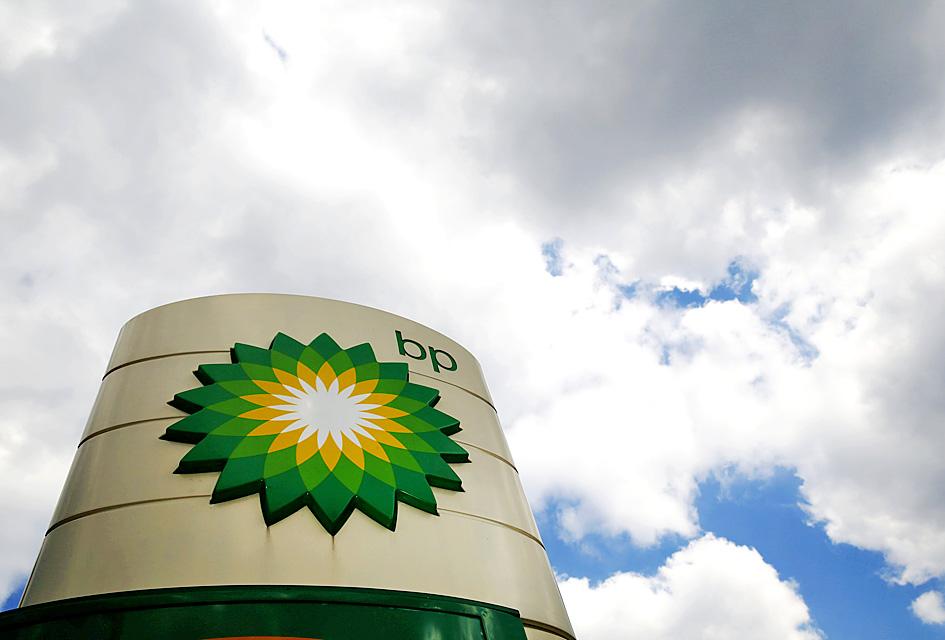British energy giant BP PLC yesterday said that it would take a hit of up to US$17.5 billion in the second quarter, as “sustained” COVID-19 fallout ravages global oil demand.
The company, fresh from outlining plans to axe almost 10,000 jobs due to the pandemic, said in a statement that it would suffer a negative impact of between US$13 billion and US$17.5 billion in non-cash impairments and write-offs.
BP also cut its long-term oil price forecast after the pandemic slammed the brakes on the global economy and hurt oil prices this year.

Photo: Reuters
“With the COVID-19 pandemic having continued during the second quarter of 2020, BP now sees the prospect of the pandemic having an enduring impact on the global economy, with the potential for weaker demand for energy for a sustained period,” the group said, adding that the virus was set to accelerate a transition to lower carbon energy.
“BP has revised its long-term price assumptions, lowering them and extending the period covered to 2050,” it said.
“As part of its long-term strategic planning, and in the context of its continuing focus on capital discipline, BP is also reviewing its intent to develop some of its exploration intangible assets,” it said.
“These actions will lead to non-cash impairment charges and write-offs in the second quarter, estimated to be in an aggregate range of US$13 billion to US$17.5 billion post-tax,” the group said.
BP chief executive Bernard Looney warned that the pandemic “increasingly looks as if it will have an enduring economic impact.”
“So, we have reset our price outlook to reflect that impact... We are also reviewing our development plans,” it said.
“All that will result in a significant charge in our upcoming results, but I am confident that these difficult decisions ... will better enable us to compete through the energy transition,” it said.
BP now expects European benchmark London Brent North Sea oil prices to average US$55 per barrel between next year and 2050, while it also lowered its guidance for gas prices.
The London-listed energy major one week ago announced plans to slash “close to 10,000” jobs, or almost 15 percent of its global workforce.
It also warned that oil prices had plunged well below the level which the group needed to turn a profit.
After companies worldwide closed their doors and airlines grounded planes towards the end of the first quarter, oil dropped off a cliff, causing prices to briefly turn negative.
However, prices have rebounded sharply in recent weeks, as governments ease lockdowns and businesses slowly reopen.

Among the rows of vibrators, rubber torsos and leather harnesses at a Chinese sex toys exhibition in Shanghai this weekend, the beginnings of an artificial intelligence (AI)-driven shift in the industry quietly pulsed. China manufactures about 70 percent of the world’s sex toys, most of it the “hardware” on display at the fair — whether that be technicolor tentacled dildos or hyper-realistic personalized silicone dolls. Yet smart toys have been rising in popularity for some time. Many major European and US brands already offer tech-enhanced products that can enable long-distance love, monitor well-being and even bring people one step closer to

Malaysia’s leader yesterday announced plans to build a massive semiconductor design park, aiming to boost the Southeast Asian nation’s role in the global chip industry. A prominent player in the semiconductor industry for decades, Malaysia accounts for an estimated 13 percent of global back-end manufacturing, according to German tech giant Bosch. Now it wants to go beyond production and emerge as a chip design powerhouse too, Malaysian Prime Minister Anwar Ibrahim said. “I am pleased to announce the largest IC (integrated circuit) Design Park in Southeast Asia, that will house world-class anchor tenants and collaborate with global companies such as Arm [Holdings PLC],”

Sales in the retail, and food and beverage sectors last month continued to rise, increasing 0.7 percent and 13.6 percent respectively from a year earlier, setting record highs for the month of March, the Ministry of Economic Affairs said yesterday. Sales in the wholesale sector also grew last month by 4.6 annually, mainly due to the business opportunities for emerging applications related to artificial intelligence (AI) and high-performance computing technologies, the ministry said in a report. The ministry forecast that retail, and food and beverage sales this month would retain their growth momentum as the former would benefit from Tomb Sweeping Day

Thousands of parents in Singapore are furious after a Cordlife Group Ltd (康盛人生集團), a major operator of cord blood banks in Asia, irreparably damaged their children’s samples through improper handling, with some now pursuing legal action. The ongoing case, one of the worst to hit the largely untested industry, has renewed concerns over companies marketing themselves to anxious parents with mostly unproven assurances. This has implications across the region, given Cordlife’s operations in Hong Kong, Macau, Indonesia, the Philippines and India. The parents paid for years to have their infants’ cord blood stored, with the understanding that the stem cells they contained